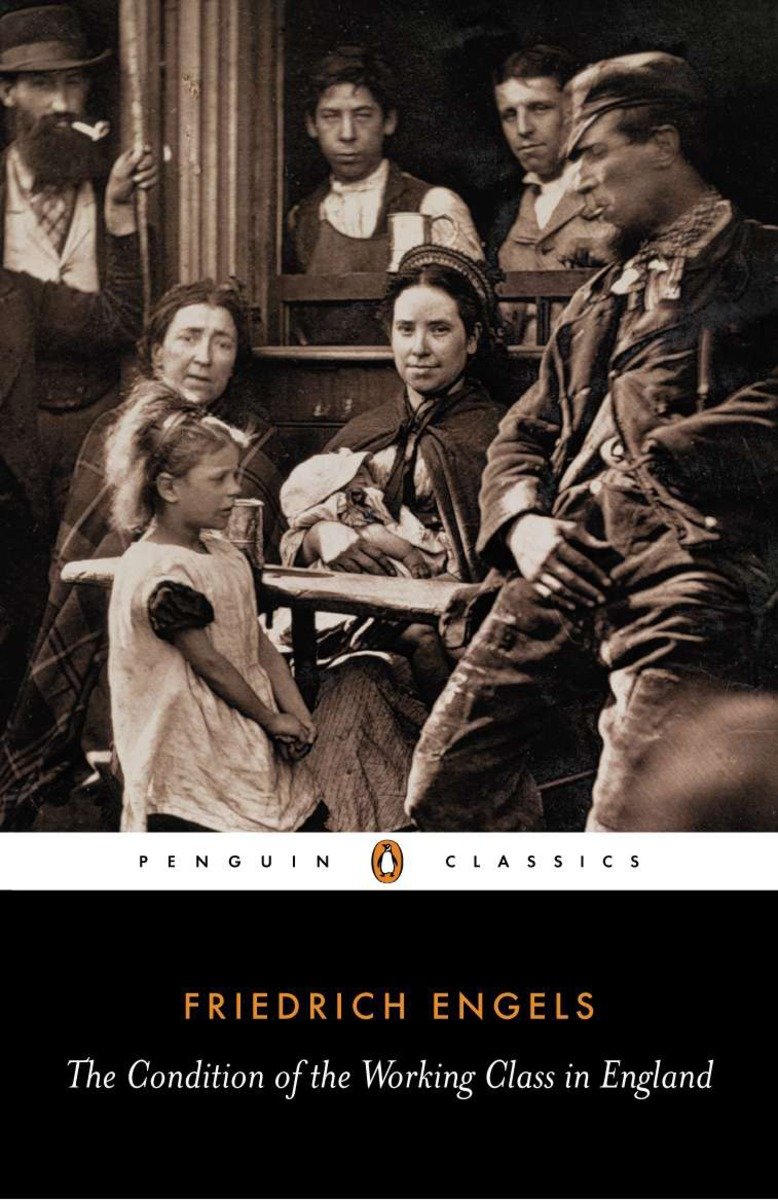The Condition of the Working Class in England
14.00 JOD
Please allow 2 – 5 weeks for delivery of this item
Add to Gift RegistryDescription
Written when Engels was only twenty-four, and inspired in particular by his time living among the poor in Manchester, this forceful polemic explores the staggering human cost of the Industrial Revolution in Victorian England. Engels paints an unforgettable picture of daily life in the new industrial towns, and for miners and agricultural workers—depicting overcrowded housing, abject poverty, child labour, sexual exploitation, dirt and drunkenness—in a savage indictment of the greed of the bourgeoisie. His fascinating later preface, written for the first English edition of 1892 and included here, brought the story up to date in the light of forty years’ further reflection. A masterpiece of committed reporting and an impassioned call to arms, this is one of the great pioneering works of social history. Based on the original translation by Florence Wischnewetzky, this volume is edited by Victor Kiernan, whose foreword considers Engels’s friendship with Marx, and the book’s position as a seminal work of socialism. Also included are notes, a detailed index, new chronology and further reading and a revised forward.
Additional information
| Weight | 0.24 kg |
|---|---|
| Dimensions | 1.88 × 12.96 × 19.69 cm |
| PubliCanadanadation City/Country | USA |
| by | |
| format | |
| Language | |
| Pages | 304 |
| publisher | |
| Year Published | 1987-6-2 |
| Imprint | |
| ISBN 10 | 0140444866 |
| About The Author | Born in Westphalia in 1820, Friedrich Engels was the son of a textile manufacturer. After military training in Berlin and already a convert to communism, Engels went to Manchester in 1842 to represent the family firm. A relationship with a mill-hand, Mary Bums, and friendship with local Owenites and Chartists helped to inspire his famous early work, The Condition of the Working Class in England in 1844. Collaboration with Marx began in 1844 and in 1847 he composed the first drafts of the Manifesto. After playing an active part in the German revolutions, Engels returned to work in Manchester until 1870, when he moved to London. He not only helped Marx financially, but reinforced their shared position through his own expositions of the new theory. After Marx’s death, he prepared the unfinished volumes of Capital for publication. He died in London in 1895. |
| Table Of Content | The Condition of the Working Class in England – Friedrich Engels Edited with a Foreword by Victor KiernanForewordTo the Working Classes of Great BritainPreface to the First German EditionPreface to the English EditionIntroductionThe state of the workers before the Industrial RevolutionThe jennyEmergence of the industrial and the agricultural proletariatThe throstle, the mule, the power-loom, the steam-engineThe victory of machine-work over hand-workThe development of industrial mightThe cotton industryThe hosiery manufactureThe manufacture of laceDyeing, bleaching, printingThe manufacture of woolThe linen tradeThe manufacture of silkThe production and manufacture of ironCoal-miningThe production of potteryAgricultureRoadways, canals, railroads, steamboatsSummaryThe emergence of the proletariat as a factor of national importanceThe middle-class's view of the workersThe Industrial ProletariatClassification of the proletariatCentralization of propertyThe levers of modern manufactureCentralization of populationThe Great TownsThe impression produced by LondonThe social war and the system of general plunderingThe lot of the poorGeneral description of the slumsIn London: St. Giles and the adjoining quartersWhitechapelThe interior of the workers' dwellingsThe homeless in the parksNight refugesDublinEdinburghLiverpoolFactory towns: Nottingham, Birmingham, Glasgow, Leeds, Bradford, HuddersfieldLancashire: General descriptionBoltonStockportAshton-under-LyneStalybridgeDetailed description of Manchester: the general system of its buildingThe Old TownThe New TownThe method of construction of working-men's quartersCourts and side streetsAncoatsLittle IrelandHulmeSalfordSummaryLodging-housesOvercrowdedness of populationCellar dwellingsThe clothing of the workersFoodTainted meatAdulteration of provisionFalse weights, etc.General conclusionCompetitionCompetition among the workers determines the minimum of wages, competition among the property-holding people determines their maximumThe worker, the slave of the bourgeoisie, is forced to sell himself by the day, and by the hourSurplus populationCommercial crisesA reserve army of workersThe hard lot of this reserve army during the crisis of 1842Irish ImmigrationThe causes and figuresDescription by Thomas CarlyleLack of cleanliness, crudeness and drunkenness among the IrishmenThe influence of Irish competition and of the contacts with the Irish upon the English workersResultsPreliminary remarksThe influence of the above-described conditions on the health of the workersThe influence of large towns, dwellings, uncleanliness, etc.The factsConsumptionTyphus, in particular in London, Scotland, and IrelandDigestive troublesThe results of drunkennessQuack remedies"Godfrey's Cordial"Mortality among workers, especially among young childrenAccusation of the bourgeoisie of social murderInfluence on the mental and moral condition of the workersAbsence of the necessary conditions for educationInadequacy of evening and Sunday schoolsIgnoranceThe worker's living conditions give him a sort of practical trainingNeglect of the workers' moral trainingThe law as the only instructor in moralsThe worker's conditions of life tempt him to disregard law and moralityThe influence of poverty and insecurity of existence upon the proletariatForced workThe centralization of the populationIrish immigrationThe difference in character between the worker and the bourgeoisThe proletarian's advantages over the bourgeoisThe unfavourable sides of the proletarian characterDrunkennessSexual irregularitiesNeglect of family dutiesContempt for the existing social orderCrimesDescription of the social warSingle Barnches of Industry. Factory-handsThe influence of machineryHand-loom weaversThe work of men being superseded by machineryFemale labour, the dissolution of the familyThe reversal of all relations within the familyThe moral consequences of the mass employment of women in factoriesJus primae noctisThe work of childrenThe apprentice systemSubsequent measuresThe facts related by the Factory ReportLong working-dayNight-workCripplesOther deformitiesThe nature of factory workRelaxation of the whole organismSpecial diseasesTestimony of the CommissionersPremature old ageThe specific influence of factory work upon the female physiqueSome especially injurious branchesAccidentsThe bourgeoisie's opinion of the factory systemFactory laws and agitation for the Ten Hours' BillThe stupefying and demoralizing nature of factory workSlaveryFactory regulationsThe truck systemThe cottage systemThe comparison of the serf of 1145 with the free working man of 1845The Remaining Branches of IndustryStocking-weaversThe lace industryCalico printersStaffordshireSheffieldProduction of machineryPotteries in the north of StaffordshireManufacture of glassHandicraftsmenDressmakers and sewing-womenLabour MovementsPreliminary remarksCrimesRevolts against machineryAssociations, strikesThe objects of the unions and strikesExcesses connected with themThe general character of the struggle waged by the English proletariat against the bourgeoisieThe battle in Manchester in May 1843Respect for the law is alien to the proletariatChartismThe history of the Chartist movementInsurrection of 1842The decisive separation of proletarian Chartism from bourgeois radicalismThe social nature of ChartismSocialismThe working men's viewsThe Mining ProletariatCornish minersAlston MoorCoal and iron minesThe work of grown-up men, women and childrenSpecial afflictionsWork in low shaftsAccidents, explosions, etc.Mental educationMoralsLaws relating to the mining industrySystematic exploitation of the coal-minersThe beginning of the workers' movementThe union of coal-minersThe great campaign of 1844 in the north of EnglandRoberts and the campaign against Justices of the Peace and the truck systemThe results of the struggleThe Agricultural ProletariatHistorical surveyPauperism in the countryThe condition of the wage-workersIncendiarismsIndifference to the Corn LawsReligious state of the agricultural labourersWales: small tenants"Rebecca" disturbancesIreland: subdivision of the landPauperization of the Irish nationCrimesAgitation for the repeal of the union with EnglandThe Attitude of the Bourgeoisie towards the ProletariatDemoralization of the English bourgeoisieIts avaricePolitical economy and free competitionPharisaic charityThe hypocrisy of political economy and politics in the question of the Corn LawsBourgeois legislation and justiceThe bourgeoisie in ParliamentA bill regulating the relation of master and servantMalthus's theoryThe Old Poor LawThe New Poor LawExamples of the brutal treatment of the poor in the workhousesThe chances of the English bourgeoisieIndexA note on the text:The text printed here is basically the original translation made by Florence Wischnewetzky for the American edition which Engels published in 1886; however, it is taken from the Moscow English edition, whose editors checked it against the German first edition for accuracy, and it has given some stylistic revision for this Penguin Classics edition. |
Only logged in customers who have purchased this product may leave a review.






Reviews
There are no reviews yet.